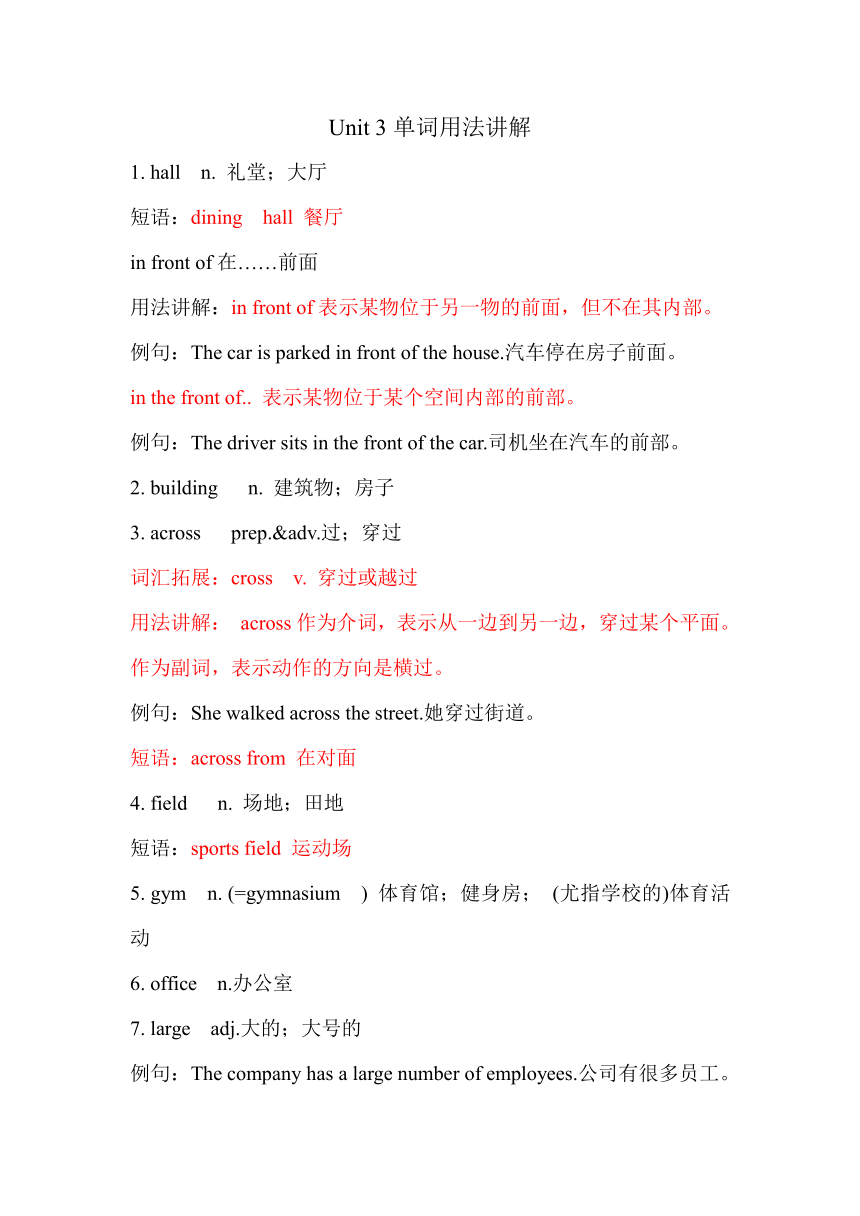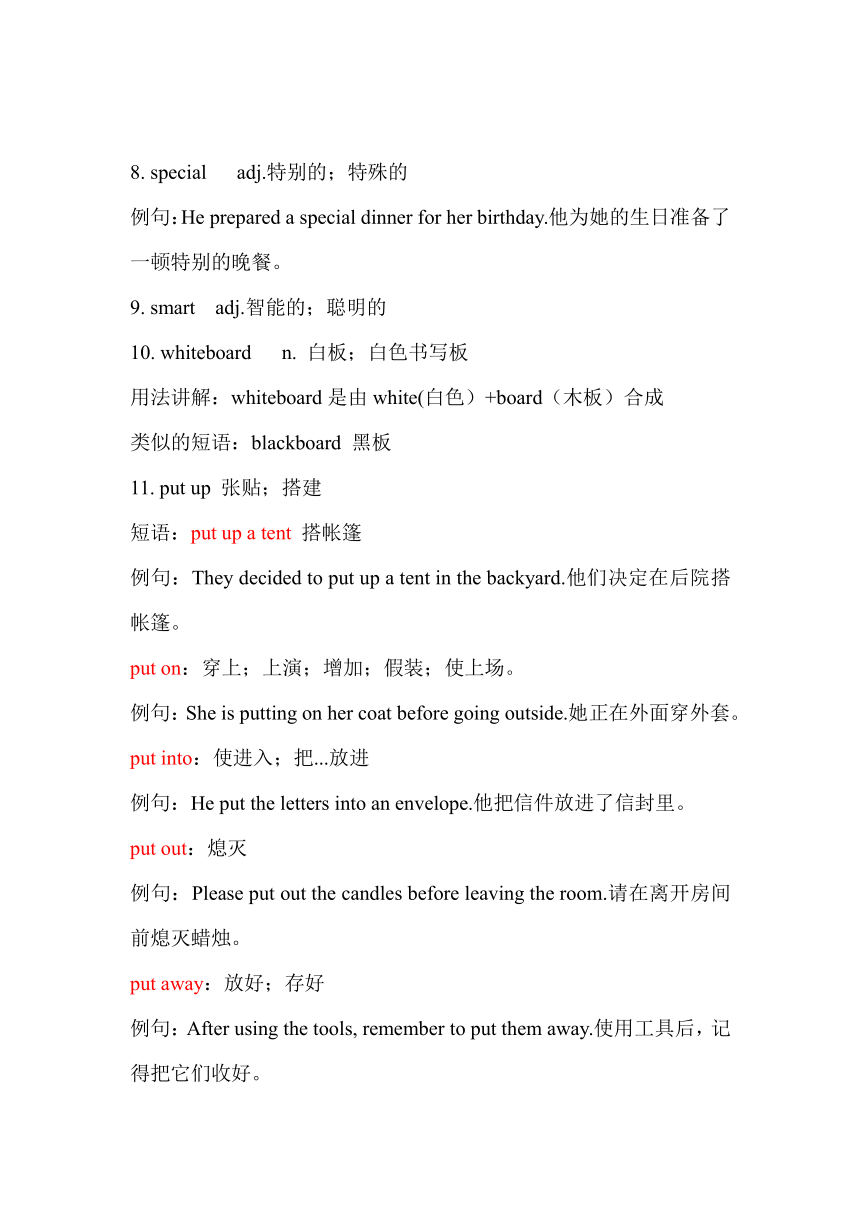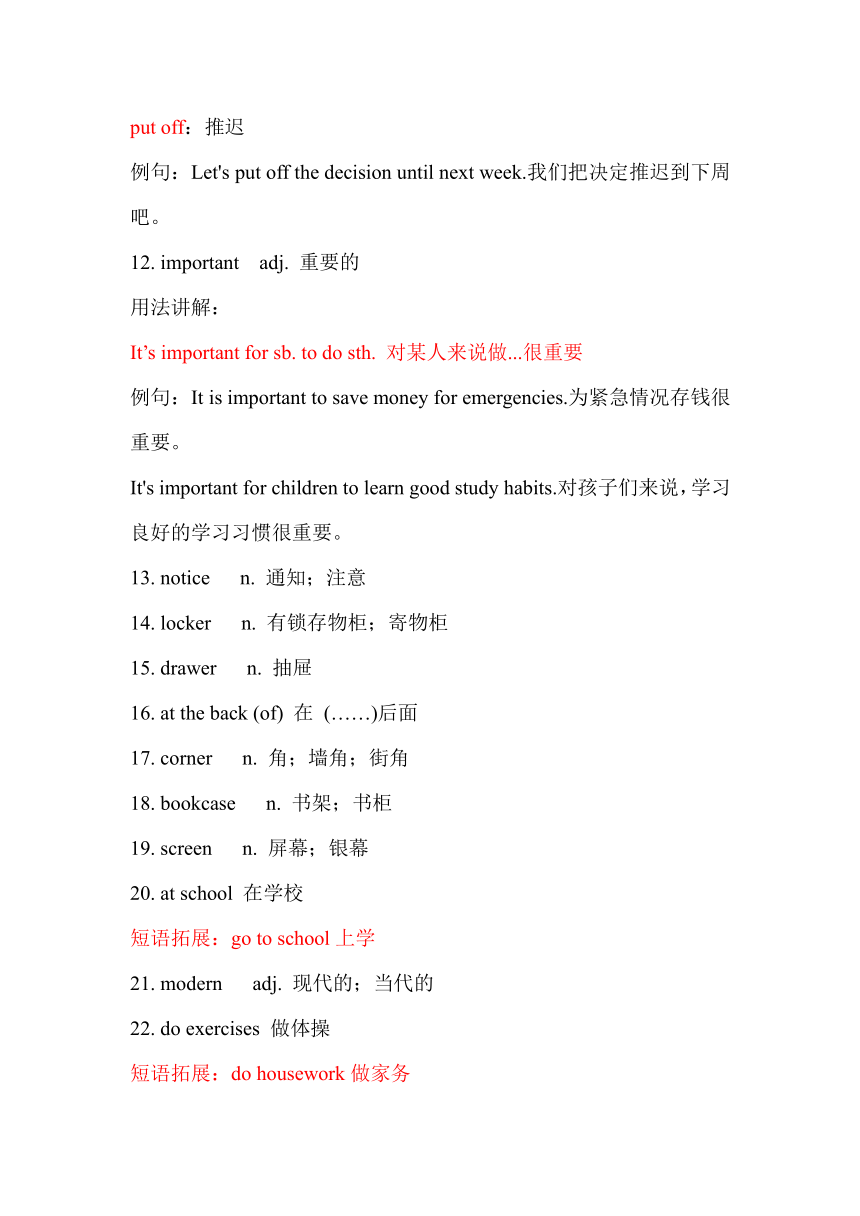Unit 3 单词讲解 2024-2025学年人教版七年级英语上册
文档属性
| 名称 | Unit 3 单词讲解 2024-2025学年人教版七年级英语上册 |

|
|
| 格式 | docx | ||
| 文件大小 | 21.2KB | ||
| 资源类型 | 教案 | ||
| 版本资源 | 人教新目标(Go for it)版 | ||
| 科目 | 英语 | ||
| 更新时间 | 2024-06-15 00:00:00 | ||
图片预览



文档简介
Unit 3单词用法讲解
1. hall n. 礼堂;大厅
短语:dining hall 餐厅
in front of在……前面
用法讲解:in front of表示某物位于另一物的前面,但不在其内部。
例句:The car is parked in front of the house.汽车停在房子前面。
in the front of.. 表示某物位于某个空间内部的前部。
例句:The driver sits in the front of the car.司机坐在汽车的前部。
2. building n. 建筑物;房子
3. across prep.&adv.过;穿过
词汇拓展:cross v. 穿过或越过
用法讲解: across作为介词,表示从一边到另一边,穿过某个平面。
作为副词,表示动作的方向是横过。
例句:She walked across the street.她穿过街道。
短语:across from 在对面
4. field n. 场地;田地
短语:sports field 运动场
5. gym n. (=gymnasium ) 体育馆;健身房; (尤指学校的)体育活动
6. office n.办公室
7. large adj.大的;大号的
例句:The company has a large number of employees.公司有很多员工。
8. special adj.特别的;特殊的
例句:He prepared a special dinner for her birthday.他为她的生日准备了一顿特别的晚餐。
9. smart adj.智能的;聪明的
10. whiteboard n. 白板;白色书写板
用法讲解:whiteboard是由white(白色)+board(木板)合成
类似的短语:blackboard 黑板
11. put up 张贴;搭建
短语:put up a tent 搭帐篷
例句:They decided to put up a tent in the backyard.他们决定在后院搭帐篷。
put on:穿上;上演;增加;假装;使上场。
例句:She is putting on her coat before going outside.她正在外面穿外套。
put into:使进入;把...放进
例句:He put the letters into an envelope.他把信件放进了信封里。
put out:熄灭
例句:Please put out the candles before leaving the room.请在离开房间前熄灭蜡烛。
put away:放好;存好
例句:After using the tools, remember to put them away.使用工具后,记得把它们收好。
put off:推迟
例句:Let's put off the decision until next week.我们把决定推迟到下周吧。
12. important adj. 重要的
用法讲解:
It’s important for sb. to do sth. 对某人来说做...很重要
例句:It is important to save money for emergencies.为紧急情况存钱很重要。
It's important for children to learn good study habits.对孩子们来说,学习良好的学习习惯很重要。
13. notice n. 通知;注意
14. locker n. 有锁存物柜;寄物柜
15. drawer n. 抽屉
16. at the back (of) 在 (……)后面
17. corner n. 角;墙角;街角
18. bookcase n. 书架;书柜
19. screen n. 屏幕;银幕
20. at school 在学校
短语拓展:go to school上学
21. modern adj. 现代的;当代的
22. do exercises 做体操
短语拓展:do housework做家务
do homework做作业
23. amazing adj. 令人惊奇(惊喜或惊叹)的
词汇拓展:amaze v. 使惊奇;使惊愕
amazed 过去式/过去分词
用法讲解:amazing用来形容事物、事件或人,强调它们具有令人惊叹的特质;amazed用来描述人的情感状态,表达他们对某事物感到的惊讶。
例句:She has an amazing ability to solve complex problems quickly.她拥有快速解决复杂问题的惊人能力。
The amazing sunset left everyone speechless.令人惊叹的日落让每个人都无言以对。
I was amazed by the complexity of the plot.我对情节的复杂性感到惊讶。
24. raise v. 使升高;提高
用法讲解:raise还有“抚养”的意思
例句:We need to raise the funds required to complete the project.我们需要筹集完成项目所需的资金。
She was raised by her grandparents.她是由祖父母抚养长大的。
25. flag n.旗;旗帜
26. most adj.&pron.大多数;最多;最大 adv. 最
用法解析:
①表示在三者或三者以上中“最多的,最大的,最...”,一般前面要加the
例句:He has the most apples out of all his friends.在他所有朋友中,他拥有的苹果最多。
She runs the most quickly in her class.她在班上跑得最快。
②作代词,意为“大多数”,可以和of连用
例句:Most of the students have already left the school.大多数学生已经离开了学校。
27. change v.&n. 改变;变化
28. seat n. 座位
词汇拓展: sit v. 坐;使坐
短语搭配:
take a seat 通常用于提供座位或邀请某人坐下。
例句:Take a seat and make yourself comfortable.请坐,让自己舒服些。
There are too many people and there are no seats in the room.人太多了,屋里没有座位了
29. delicious adj.美味的;可口的
30. How about ……怎么样;如何
用法讲解:
用来提出建议
How about后面通常接名词、动名词或代词,用来提出建议或提供选择。
例句:How about going to the beach this weekend 这个周末去海滩怎么样?
How about going for a walk 去散步怎么样?
31. yours pron. 你的;您的
词汇拓展:人称代词单数/复数 you
形容词性物主代词your
用法讲解:
①名词性物主代词,相当于your+名词
②用于书信结尾的签名前,通常写作Yours
32. similar adj.类似的;相像的
短语:be similar to类似的;相像的
例句:These two paintings are similar in style.这两幅画的风格相似。
His approach is similar to mine.他的方法与我的相似。
33. sound v.听起来;好像 n.声音;响声
用法讲解:
作系动词,表示“听起来”,后面接形容词
作名词,表示“声音或响声”。
例句:The music sounds beautiful.音乐听起来很美。
She heard the sound of footsteps outside.她听到外面有脚步声。
34. bye for now 再见
1. hall n. 礼堂;大厅
短语:dining hall 餐厅
in front of在……前面
用法讲解:in front of表示某物位于另一物的前面,但不在其内部。
例句:The car is parked in front of the house.汽车停在房子前面。
in the front of.. 表示某物位于某个空间内部的前部。
例句:The driver sits in the front of the car.司机坐在汽车的前部。
2. building n. 建筑物;房子
3. across prep.&adv.过;穿过
词汇拓展:cross v. 穿过或越过
用法讲解: across作为介词,表示从一边到另一边,穿过某个平面。
作为副词,表示动作的方向是横过。
例句:She walked across the street.她穿过街道。
短语:across from 在对面
4. field n. 场地;田地
短语:sports field 运动场
5. gym n. (=gymnasium ) 体育馆;健身房; (尤指学校的)体育活动
6. office n.办公室
7. large adj.大的;大号的
例句:The company has a large number of employees.公司有很多员工。
8. special adj.特别的;特殊的
例句:He prepared a special dinner for her birthday.他为她的生日准备了一顿特别的晚餐。
9. smart adj.智能的;聪明的
10. whiteboard n. 白板;白色书写板
用法讲解:whiteboard是由white(白色)+board(木板)合成
类似的短语:blackboard 黑板
11. put up 张贴;搭建
短语:put up a tent 搭帐篷
例句:They decided to put up a tent in the backyard.他们决定在后院搭帐篷。
put on:穿上;上演;增加;假装;使上场。
例句:She is putting on her coat before going outside.她正在外面穿外套。
put into:使进入;把...放进
例句:He put the letters into an envelope.他把信件放进了信封里。
put out:熄灭
例句:Please put out the candles before leaving the room.请在离开房间前熄灭蜡烛。
put away:放好;存好
例句:After using the tools, remember to put them away.使用工具后,记得把它们收好。
put off:推迟
例句:Let's put off the decision until next week.我们把决定推迟到下周吧。
12. important adj. 重要的
用法讲解:
It’s important for sb. to do sth. 对某人来说做...很重要
例句:It is important to save money for emergencies.为紧急情况存钱很重要。
It's important for children to learn good study habits.对孩子们来说,学习良好的学习习惯很重要。
13. notice n. 通知;注意
14. locker n. 有锁存物柜;寄物柜
15. drawer n. 抽屉
16. at the back (of) 在 (……)后面
17. corner n. 角;墙角;街角
18. bookcase n. 书架;书柜
19. screen n. 屏幕;银幕
20. at school 在学校
短语拓展:go to school上学
21. modern adj. 现代的;当代的
22. do exercises 做体操
短语拓展:do housework做家务
do homework做作业
23. amazing adj. 令人惊奇(惊喜或惊叹)的
词汇拓展:amaze v. 使惊奇;使惊愕
amazed 过去式/过去分词
用法讲解:amazing用来形容事物、事件或人,强调它们具有令人惊叹的特质;amazed用来描述人的情感状态,表达他们对某事物感到的惊讶。
例句:She has an amazing ability to solve complex problems quickly.她拥有快速解决复杂问题的惊人能力。
The amazing sunset left everyone speechless.令人惊叹的日落让每个人都无言以对。
I was amazed by the complexity of the plot.我对情节的复杂性感到惊讶。
24. raise v. 使升高;提高
用法讲解:raise还有“抚养”的意思
例句:We need to raise the funds required to complete the project.我们需要筹集完成项目所需的资金。
She was raised by her grandparents.她是由祖父母抚养长大的。
25. flag n.旗;旗帜
26. most adj.&pron.大多数;最多;最大 adv. 最
用法解析:
①表示在三者或三者以上中“最多的,最大的,最...”,一般前面要加the
例句:He has the most apples out of all his friends.在他所有朋友中,他拥有的苹果最多。
She runs the most quickly in her class.她在班上跑得最快。
②作代词,意为“大多数”,可以和of连用
例句:Most of the students have already left the school.大多数学生已经离开了学校。
27. change v.&n. 改变;变化
28. seat n. 座位
词汇拓展: sit v. 坐;使坐
短语搭配:
take a seat 通常用于提供座位或邀请某人坐下。
例句:Take a seat and make yourself comfortable.请坐,让自己舒服些。
There are too many people and there are no seats in the room.人太多了,屋里没有座位了
29. delicious adj.美味的;可口的
30. How about ……怎么样;如何
用法讲解:
用来提出建议
How about后面通常接名词、动名词或代词,用来提出建议或提供选择。
例句:How about going to the beach this weekend 这个周末去海滩怎么样?
How about going for a walk 去散步怎么样?
31. yours pron. 你的;您的
词汇拓展:人称代词单数/复数 you
形容词性物主代词your
用法讲解:
①名词性物主代词,相当于your+名词
②用于书信结尾的签名前,通常写作Yours
32. similar adj.类似的;相像的
短语:be similar to类似的;相像的
例句:These two paintings are similar in style.这两幅画的风格相似。
His approach is similar to mine.他的方法与我的相似。
33. sound v.听起来;好像 n.声音;响声
用法讲解:
作系动词,表示“听起来”,后面接形容词
作名词,表示“声音或响声”。
例句:The music sounds beautiful.音乐听起来很美。
She heard the sound of footsteps outside.她听到外面有脚步声。
34. bye for now 再见
同课章节目录
- starters 预备篇(2012秋审查)
- Unit 1 Good morning !
- Unit 2 What’s this in English?
- Unit 3 What color is it ?
- Unit 1 My name's Gina.
- Section A
- Section B
- Unit 2 This is my sister.
- Section A
- Section B
- Unit 3 Is this your pencil?
- Section A
- Section B
- Unit 4 Where's my schoolbag?
- Section A
- Section B
- Unit 5 Do you have a soccer ball?
- Section A
- Section B
- Unit 6 Do you like bananas?
- Section A
- Section B
- Unit 7 How much are these socks?
- Section A
- Section B
- Unit 8 When is your birthday?
- Section A
- Section B
- Unit 9 My favorite subject is science.
- Section A
- Section B
